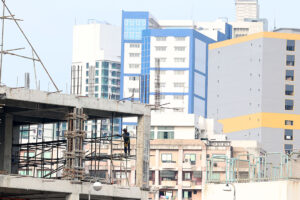‘Not the right time’ to raise wages — NEDA
THE PROPOSED P100 increase in the minimum wage of private workers may stoke inflation, hurt gross domestic product (GDP) growth and increase unemployment, National Economic and Development Authority (NEDA) Secretary Arsenio M. Balisacan said.

By Luisa Maria Jacinta C. Jocson, Reporter
THE PROPOSED P100 increase in the minimum wage of private workers may stoke inflation, hurt gross domestic product (GDP) growth and increase unemployment, National Economic and Development Authority (NEDA) Secretary Arsenio M. Balisacan said.
“Our position at NEDA is that it’s not the right time,” he said during the SNAP Conversations webinar on Thursday.
“We are working very hard to sustain the momentum in reducing inflation to the target of 2-4% and the last thing we want is to reverse those gains we have achieved for the last several months.”
The Senate on Monday approved on final reading a bill that seeks to implement a P100 across-the-board minimum wage hike for private sector workers.
The last legislated national wage hike was in 1989. Since then, pay rates have been decided by regional wage boards.
The House of Representatives said it is planning to tackle next week pending bills that seek a P150 minimum wage increase for private sector workers.
A separate bill has also been filed at the House seeking to increase wages by P750, while congressmen are also studying a proposal for a P350 to P400 wage hike.
Mr. Balisacan said a legislated P100 wage hike would “negatively impact” the recent inflation downtrend.
“Inflation that would be induced by the wage hike could run from 0.2 to 0.8 percentage point (ppt) depending on how the hike has been employed,” he said.
Inflation has settled within the central bank’s 2-4% target for two straight months as it eased to 2.8% in January from 3.9% in December.
The NEDA chief said the wage hike could also lead to a reduction in GDP growth ranging from 0.1 to 0.5 point.
“The lower number assumes the wage hike will only apply to minimum wage earners but if there is a cascading effect of that to other workers, then it would go as high as a 0.5-ppt reduction in GDP,” he added.
The economy grew by 5.6% last year, slower than 7.6% in 2022. It also fell short of the government’s 6-7% target.
This year, the government is targeting 6.5-7.5% GDP growth.
On unemployment, Mr. Balisacan said the wage increase could derail the progress made in bringing down the jobless rate to historical lows.
“We would want to sustain that and even improve the quality of the employment generated,” he said.
Latest data from the Philippine Statistics Authority (PSA) showed that the unemployment rate dropped to 4.3% in 2023, the lowest in almost two decades.
The wage hike could increase unemployment by 0.2 ppt to 0.7 ppt, equivalent to 100,000 to 340,000 jobless Filipinos.
Mr. Balisacan said the NEDA supports raising wages, but this must be negotiated through the regional wage boards.
“We are not saying we are against increases in wages, in fact we are, we would want improvement in wages, but we would rather have those wages negotiated at the regional level,” he said.
He added that allowing wage negotiations at the regional level would take into account the varying market and economic conditions in each area.
Bank of the Philippine Islands Lead Economist Emilio S. Neri, Jr. said any minimum wage increases should be negotiated on a regional basis.
“We encourage an increase in wages, but these have to be sector per sector,” he said at the same webinar.
Last year, workers in Metro Manila got a P40 increase in the daily minimum wage.
Wage increases were also approved in Cagayan Valley (P30), Ilocos Region (P35), Central Luzon (P40), Central Mindanao (P35), Western Visayas (P30) and the Southern Tagalog Region (P35 to P50).
Imposing a national wage hike could translate to job losses, Mr. Neri added.
“We’re seeing very good numbers in our employment futures in the Philippines. This might be reversed if we insist on a minimum wage (increase)” he said. “It may actually even stoke inflation. Because of the requirement of higher wages, producers and service providers may be compelled to pass on costs to consumers.”
The Bangko Sentral ng Pilipinas (BSP) earlier said it did not take into account the proposed P100 minimum wage hike in its risk-adjusted inflation projections.
It also said higher-than-expected wage increases could “pose a threat to the inflation outlook.”
The BSP’s baseline inflation forecast for this year is set at 3.6% and 3.2% for 2025. Should risks materialize, inflation may average 3.9% and 3.5% this year and next year, respectively.













